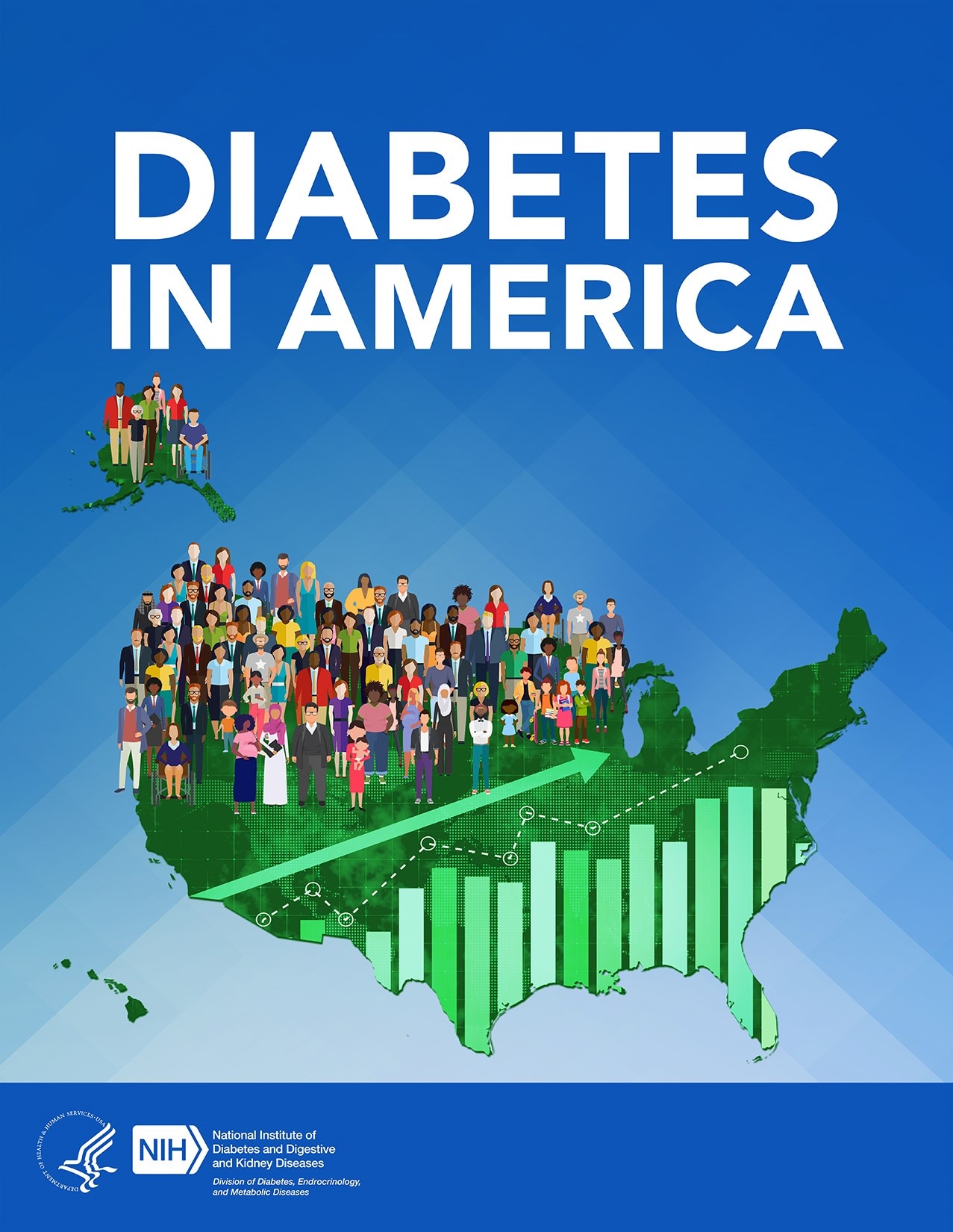Health Information Updates
Three updated articles in “Diabetes in America”

Three updated articles are now available in “Diabetes in America,” NIDDK’s assessment of data on diabetes and its complications in the United States.
“Kidney Disease and Diabetes” reviews recent advances in the understanding of the development, course, and management of chronic kidney disease (CKD) in people with diabetes. For example, the management of kidney disease was revolutionized by new medication classes, including GLP-1 receptor agonists, sodium-glucose cotransporter-2 (SGLT2) inhibitors, and mineralocorticoid receptor antagonists (MRAs). Diabetes is the leading cause of CKD, a public health problem that affects nearly 14% of the U.S. population.
“Sociodemographic Characteristics of Youth and Adults with Diabetes,” describes sociodemographic characteristics – such as age, race, location, and levels of education and income – of people in the United States and compares them to the characteristics of people with diagnosed diabetes. These data, based on information from the latest National Health Interview Survey (NHIS), are important for public health efforts, including health care planning, guidance for federal assistance programs, and resource allocation.
“Disability and Diabetes in Adults” presents new data from studies on diabetes-related disability, summarizes risk factors for disability prevalence associated with diabetes, and reviews evidence that disability may be preventable or modifiable. Studies have consistently found that people with diabetes have a 50–90% increased risk of disability, and a variety of factors are associated with this risk.
New or updated articles such as this one are published on a rolling basis in NIDDK’s Strategic Plans and Reports and on the National Library of Medicine’s Bookshelf, and are searchable in PubMed®.
NIDDK publishes updates to Weight Management Medication content
NIDDK has updated its health information topic, “Prescription Medications to Treat Overweight & Obesity,” to include the most recently approved medication available for weight management, tirzepatide (Zepbound). Six weight management medications are now approved by the U.S. Food and Drug Administration for long-term use.
The updated content:
- explains how each medication works.
- addresses risks and side effects of the medication.
- highlights topics people may talk about with a health care professional regarding a weight-loss medication.
The topic also includes updated information about setmelanotide (IMCIVREE), which was approved for those with Bardet-Biedl syndrome, a rare genetic disorder. NIDDK regularly publishes updates to weight management content and other health information topics, which are available in English and Spanish.
NIDDK works across many fronts to address diabetes
NIDDK’s commitment to address diabetes was exemplified in several recent efforts, ranging from public outreach to innovative research activities.
NIDDK launched a public health campaign to raise awareness of diabetes during National Diabetes Month last November. The Take Charge of Tomorrow—Preventing Diabetes Health Problems campaign focused on communicating how to lower diabetes risk and how to manage diabetes for people who have it. To get the word out, Institute Director Dr. Griffin P. Rodgers spoke with TV and radio outlets across the country, and more than 150 syndicated print and online articles covered the campaign.
In October, the NIDDK-supported DISCOVERY study was launched to advance understanding of the biologic, social, and environmental drivers of youth-onset type 2 diabetes, which is more challenging to treat and progresses more aggressively than adult-onset type 2 diabetes. Data from the nationwide study will help inform how to better identify which children are at highest risk for developing type 2 diabetes and improve prevention, screening, and management of the disease in young people.
NIDDK also added a new tool to its website last August, called the Diabetes Risk Management Calculator, to help adults ages 20 and older determine how much weight to lose to lower their risk of developing type 2 diabetes. Losing just 5-7% of weight can significantly improve health.
In July, an NIDDK-supported working group of international diabetes experts published “A global initiative to deliver precision health in diabetes” in Nature. Co-led by Dr. William Cefalu, director of NIDDK’s Division of Diabetes, Endocrinology, and Metabolic Diseases, the working group called for a focus on understanding diabetes heterogeneity, such as why people have different risks of developing diabetes or experiencing varying symptoms, progression rates, or responses to treatment. These levels of understanding are necessary to achieve the goal of precision medicine, which aims to improve human health by addressing the variability in a person’s genomics and biological features, as well as the behavioral and social context in which they live, to deliver the right treatment for the right person.
The executive committee of NIDDK’s Working Group of Council on Heterogeneity of Diabetes also published an article in the Journal of Clinical Endocrinology and Metabolism December 2024, entitled “A Research Roadmap to Address the Heterogeneity of Diabetes and Advance Precision Medicine.” This article discussed the issues related to the heterogeneity of diabetes and presented a corresponding roadmap for future research in type 2 diabetes heterogeneity to be addressed by the group.
“NIDDK has put a major focus on understanding diabetes heterogeneity so that we can tailor prevention and treatment regimens and, ultimately, improve health outcomes in all people with and at-risk for diabetes.” said Dr. Rodgers.
These efforts are just a handful of NIDDK’s ongoing work to advance and disseminate diabetes knowledge. Visit the NIDDK website to learn more about diabetes.


